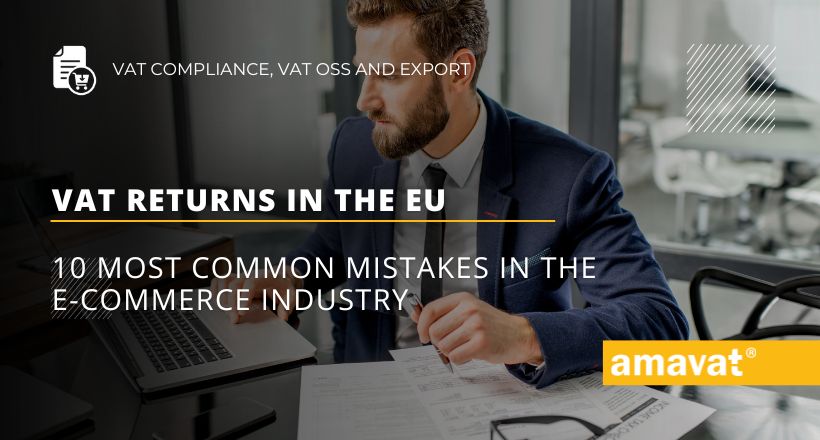VAT returns in the EU: 10 most common mistakes in the e-commerce industry
VAT return is one of the most important responsibilities for entrepreneurs, including those in the e-commerce sector. Properly managing VAT returns not only protects the company from penalties but also allows for more effective financial management. In the rapidly evolving online sales space, especially in the EU, where VAT regulations differ between countries, mistakes are easy to make. Below, we present the 10 most common mistakes made by e-commerce entrepreneurs in VAT settlements.
1. Failing to register for VAT in relevant countries
E-commerce entrepreneurs often sell their products to customers in different EU countries. One of the most common mistakes is the lack of VAT registration in the country where the goods are stored or to which the goods are sold and the limit of EUR 10,000 net has been exceeded without active registration for VAT-OSS. VAT rules in the EU require companies to register in each country where they store goods or where they exceed a certain sales threshold if they do not use the VAT-OSS procedure. Failure to register can lead to penalties and also the loss of the right to deduct VAT in these countries.
2. Incorrect application of VAT rates
Different VAT rates apply in the EU depending on the country and the type of goods and services. One common mistake is using incorrect VAT rates when selling internationally. For instance, some products may be subject to reduced VAT rates (e.g., books or medicines), but entrepreneurs may carelessly apply the standard rate. It is important to thoroughly understand the regulations in the countries where the company sells products.
3. Lack of proper VAT documentation
VAT documentation is crucial for accurate tax settlement. In e-commerce, entrepreneurs often make the mistake of not keeping complete documentation of international transactions, which can lead to difficulties in settling VAT. This particularly applies to transport documentation, inter-warehouse movements and the shipment of goods to physical customers. At the same time, sales and purchase invoices must comply with local VAT regulations in order to allow for the correct deduction of tax.
4. Incorrect settlement of B2B and B2C transactions
Differences in VAT returns between B2B (business-to-business) and B2C (business-to-consumer) transactions are often a problem for e-commerce entrepreneurs. Different rules apply to B2B transactions than to B2C, especially in the context of intra-EU transactions. Companies that incorrectly apply reverse charge VAT rules in B2B transactions may face penalties.
5. Ignoring differences in VAT regulations across EU countries
Many e-commerce entrepreneurs make the mistake of assuming that VAT regulations are identical across the European Union. In reality, regulations differ from one member state to another. Misunderstanding these differences can lead to serious consequences, including financial penalties. It is crucial for entrepreneurs to seek advice from tax experts to ensure compliance with local VAT requirements in each country where they operate.
6. Incorrect application of VAT exemptions
E-commerce entrepreneurs often take advantage of VAT exemptions under local regulations (e.g., in Poland, up to 200,000 PLN in annual turnover). A common mistake is the incorrect application of this exemption, especially when the company sells to other EU countries where such exemptions may not apply. In such cases, the entrepreneur may incorrectly charge VAT on sales, which leads to errors in VAT returns.
7. Failure to monitor updates to applicable regulations
VAT law, especially in e-commerce, is subject to frequent changes. For example, changes to the VAT OSS (One Stop Shop) system introduced in 2021 aimed to simplify VAT returns for cross-border transactions. Companies that do not keep track of current changes may unconsciously apply outdated regulations, leading to errors in settlements.
8. Failure to deduct VAT on private expenses
E-commerce entrepreneurs sometimes confuse business costs with personal expenses, attempting to deduct VAT on purchases not related to business activities. Examples include expenses for products used privately, such as household equipment or clothing, which do not have a direct connection to the business. Such mistakes can be easily detected during a tax audit, resulting in additional penalties.
9. Incorrect settlement of digital services
The sale of digital services (e.g., e-books, software) is subject to specific VAT return rules in the EU. A common mistake that entrepreneurs make is the incorrect billing of these services, especially if they are provided to consumers outside the country where the company is registered. According to EU regulations, VAT on digital services should be settled in the consumer’s country, which means that entrepreneurs must track VAT regulations in all the countries where they provide services.
10. Failure to use VAT OSS
The VAT OSS (One Stop Shop) system was introduced to simplify VAT returns for online sellers throughout the EU. Companies engaged in cross-border sales that do not use this system may encounter difficulties with VAT registration in multiple countries and with settling VAT according to local regulations. Registration in VAT-OSS significantly simplifies these processes by allowing VAT return from transactions in various EU countries using a single declaration.
Summary
VAT returns in the e-commerce sector, especially in the European market, requirea thorough understanding of regulations and their regular updates. Mistakes in VAT returns can not only burden the company but also harm its reputation. Therefore, entrepreneurs should invest time in training and education on tax settlements and, if necessary, seek help from VAT experts.
amavat® provides comprehensive VAT settlement services for e-commerce, allowing you to focus on growing your business. Choose our services and eliminate the stress of VAT settlement: Contact us.





